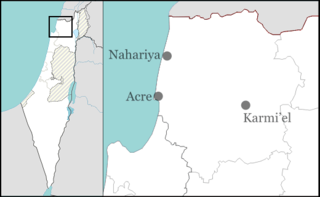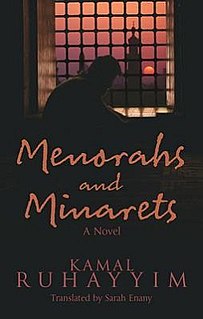Antisemitism in the Arab world refers to prejudice against and hatred of Jews in Arab countries. Antisemitism has increased greatly in the region since the beginning of the 20th century, for several reasons: the dissolution and breakdown of the Ottoman Empire and traditional Islamic society; European influence, brought about by Western imperialism and Arab Christians; Nazi propaganda and relations between Nazi Germany and the Arab world; resentment over Jewish nationalism; the rise of Arab nationalism; and the widespread proliferation of anti-Jewish and anti-Zionist conspiracy theories.

The Book of Genesis is the first book of the Hebrew Bible and the Christian Old Testament. Its Hebrew name is the same as its first word, Bereshit. Genesis is an account of the creation of the world, the early history of humanity, and of Israel's ancestors and the origins of the Jewish people.

Naguib Mahfouz Abdelaziz Ibrahim Ahmed Al-Basha, IPA: [næˈɡiːb mɑħˈfuːzˤ]; 11 December 1911 – 30 August 2006) was an Egyptian writer who won the 1988 Nobel Prize for Literature. Mahfouz is regarded as one of the first contemporary writers of Arabic literature, along with Taha Hussein, to explore themes of existentialism. He is the only Egyptian to win the Nobel Prize in Literature. He published 35 novels, over 350 short stories, 26 movie scripts, hundreds of op-ed columns for Egyptian newspapers, and seven plays over a 70-year career, from the 1930s until 2004. All of his novels take place in Egypt, and always mentions the lane, which equals the world. His most famous works include The Trilogy and Children of Gebelawi. Many of Mahfouz's works have been made into Egyptian and foreign films; no Arab writer exceeds Mahfouz in number of works that have been adapted for cinema and television. While Mahfouz's literature is classified as realist literature, existential themes appear in it.

The Torah is the compilation of the first five books of the Hebrew Bible, namely the books of Genesis, Exodus, Leviticus, Numbers and Deuteronomy. In that sense, Torah means the same as Pentateuch or the Five Books of Moses. It is also known in the Jewish tradition as the Written Torah. If meant for liturgic purposes, it takes the form of a Torah scroll. If in bound book form, it is called Chumash, and is usually printed with the rabbinic commentaries.

Ishmael was the first son of Abraham through the Egyptian Hagar, the common patriarch of the Abrahamic religions, and is venerated by Muslims as a prophet. According to the Genesis account, he died at the age of 137.

Egyptian Jews constitute both one of the oldest and youngest Jewish communities in the world. The historic core of the Jewish community in Egypt consisted mainly of Arabic-speaking Rabbanites and Karaites. After their expulsion from Spain, more Sephardi and Karaite Jews began to emigrate to Egypt and their numbers increased significantly with the growth of trading prospects after the opening of the Suez Canal in 1869. As a result, Jews from all over the territories of the Ottoman Empire as well as Italy and Greece started to settle in the main cities of Egypt, where they thrived. The Ashkenazi community, mainly confined to Cairo's Darb al-Barabira quarter, began to arrive in the aftermath of the waves of pogroms that hit Europe in the latter part of the 19th century.
The Desert of Paran or Wilderness of Paran, is a location mentioned in the Hebrew Bible. It is one of the places where the Israelites spent part of their 40 years of wandering after the Exodus, and was also a home to Ishmael, and a place of refuge for David.

Palace Walk is a novel by Nobel Prize winning Egyptian writer Naguib Mahfouz, and the first installment of Mahfouz's Cairo Trilogy. Originally published in 1956 with the title Bayn al-qasrayn, the book was then translated into English by William M. Hutchins and Olive Kenny, and then published by Doubleday (publisher) in 1990. The book's Arabic title translates into 'between two palaces'. The setting of the novel is Cairo around the time period of World War I. It begins in 1917, during World War I, and ends in 1919, the year of the Egyptian Revolution of 1919. The novel is written in a social realist style and reflects the social and political setting of Egypt in during 1917 to 1919.

Bi'ina or al-Bi'na is an Arab town in the Northern District of Israel. It is located east of Akko. In 2003, Bi'ina merged with Majd al-Krum and Deir al-Asad to form the city of Shaghur, but was reinstated as a local council in 2008 after Shaghur was dissolved. Bi'ina has a mostly Muslim population (92%) with a small Christian minority (8%); in 2019 its population was 8,381.
Muslims are adherents of Islam, an Abrahamic monotheistic religion.
The Banipal Prize, whose full name is the Saif Ghobash–Banipal Prize for Arabic Literary Translation, is an annual prize awarded to a translator for the published English translation of a full-length literary work in the Arabic language. The prize was inaugurated in 2006 by the literary magazine Banipal which promotes the diffusion of contemporary Arabic literature through English translations and the Banipal Trust for Arab Literature. It is administered by the Society of Authors in the UK, and the prize money is sponsored by Omar Saif Ghobash and his family in memory of Ghobash's late father Saif Ghobash. As of 2009, the prize money amounted to £3000.
Egypt's first experience of secularism started with the British Occupation (1882–1952), the atmosphere which allowed the protection of debate. In this environment pro-secularist intellectuals like Ya'qub Sarruf, Faris Nimr, Nicola Haddad whom sought political asylum from Ottoman Rule were able to publish their work. This debate had then become a burning issue with the work of Egyptian Shaykh Ali Abdel Raziq (1888–1966), “The most momentous document in the crucial intellectual and religious debate of modern Islamic history”.
The 1838 Druze attack on Safed began on July 5, 1838, during the Druze revolt against the rule of Ibrahim Pasha of Egypt. Tensions had mounted as the Druze captured an Egyptian garrison outside of Safed. The local Safed militia of several hundred was heavily outnumbered by the Druze, and the city was gripped in despair as the militia eventually abandoned the city and the Druze rebels entered the city on July 5. The Druze rebels and a Muslim mob descended on the Jewish quarter of Safed and, in scenes reminiscent of the Safed plunder four years earlier, spent three days attacking Jews, plundering their homes and desecrating their synagogues. Some Jews ended up leaving the town, moving south to Jerusalem and Acre. Among them was Israel Beck, whose printing press had been destroyed a second time.

Mein Kampf, Adolf Hitler's 900-page autobiography outlining his political views, has been translated into Arabic a number of times since the early 1930s.

Kayleigh McEnany is an American conservative political commentator and author who served as the 33rd White House press secretary for the Trump administration from April 2020 to January 2021. She currently serves as an on-air contributor for Fox News.
Kamal Ruhayyim is an Egyptian writer. He obtained a doctorate in law from Cairo University, before pursuing a career in law enforcement. As an author, he is best known for the Galal trilogy, which consist of Diary of a Jewish Muslim, Days in the Diaspora and Menorahs and Minarets. All three books have been translated by Sarah Enany and published by AUC Press.
Sarah Enany is a literary translator.

Menorahs and Minarets: A Novel is a 2017 book by Egyptian author Kamal Ruhayyim.

Days in the Diaspora is a 2008 book by Egyptian author Kamal Ruhayyim, translated into English in 2012.
Al-Kamal ibn al-Humam was a prominent Egyptian Hanafi-Maturidi, polymath, legal theorist and jurist. He was a mujtahid and highly regarded in many sciences of knowledge and was also a Sufi. Highly regarded in all fields of knowledge, including fiqh, usul al-fiqh, kalam, logic, Sufism, Arabic language and literature, tafsir, Hadith, Islamic law of inheritance, mathematics, and music.











